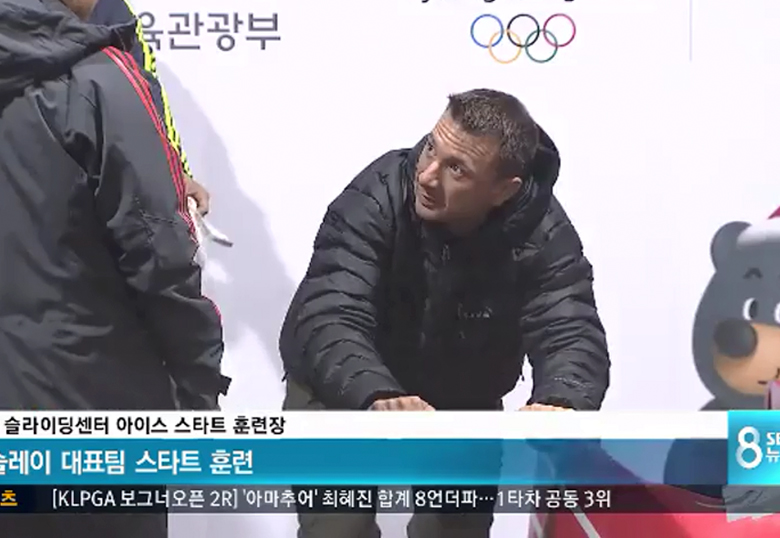Alumnus Florian Linder (BSc ’00) has carved out quite a reputation in the international bobsleigh community. For the third consecutive Olympics he will serve as a technical coach for the host nation’s bobsleigh programs – this time the South Korean contingent. One might even call him a sled whisperer.
“This will be my third host nation, which is a fairly unique experience,” he laughs. “We’ve been successful as host nation coaches so far and I have high expectations for this team as well.”

How a Lethbridge College instructor, and former kinesiology student and sprinter on the Horns track and field team, assumed the role of technical guru for Canadian, Russian and now South Korean bobsleigh programs is a tale of seizing opportunity. At no point during his U of L educational journey did Linder foresee such a future, and it wasn’t until years after graduation that he specifically applied his acquired kinesiology knowledge. Nonetheless, his time at the U of L set the foundation for everything that would follow.
“I really enjoyed my time here and my time with the track team. Larry (Steinke) and George (Gemer) gave me the base through which I was able to go into bobsleigh, so it all started here and gave me quite an experience,” he says.
Upon graduation, Linder still had hopes of running track at the highest level, so he moved to Calgary to continue training. He took jobs as a personal trainer and worked on his dream. A year later, he got his break, but rather than it being on the track, it came from a bobsled coach who spotted him at a shared indoor training facility. They talked off and on for the next year before Linder agreed to take part in a bobsled testing camp in the summer of 2002.
“I did fairly well, I guess, because I got picked up by the national team and competed for Canada for the next four years,” says Linder.
Racing in both two- and four-man events, Linder travelled the world as a bobsled athlete, culminating with his inclusion on Canada’s 2006 Turin Olympic Team. Following Turin, he retired from competing, but a year later he was back, this time as an intern technical coach with Bobsleigh Canada.
He coached for the next four years, taking Canada through the 2010 Vancouver Olympics before again leaving the sport. His sojourn was brief though as he was summoned out of retirement by a good friend, Canadian bobsleigh legend Pierre Leuders. The most decorated driver in Canadian bobsleigh history, Leuders had been approached by the Russian Olympic Federation to coach their bobsleigh team in preparation for the Sochi Olympics. Linder signed on and then repeated the cycle with Leuders for 2018 and Pyeongchang, joining the Korean contingent in May 2017.
Linder’s expertise comes from his sprinting background and his responsibility is the explosive start of each race.

“I’m a technical starts coach and performance analyst, so I’m responsible for the first 60 metres, the actual push,” he says, adding he was enthused to apply his kinesiology education when he got into coaching. “I work with them on push technique, how they get into the sled and how they sit. I also do some sprint training with them and then analyze the data of the group going down the track, their acceleration and deceleration, and where we can find time for them throughout the run.”
Over the years, Linder also worked with Swiss luxury watch giant Omega, which operates virtually all the timing mechanisms in high-level sport. He helped develop data boxes, currently implanted on every bobsled, that track a litany of measurements that allow coaches to analyze how a sled moves down a track.
He readily admits that bobsleigh is not for everyone and he didn’t exactly fall in love with the sport his first few times in a sled.
“I remember getting out at the bottom of my first run and I didn’t know what happened,” says Linder. “I still have a hard time describing to someone what it’s like because there really isn’t anything to compare it to.”
He says the fear factor is real and something that motivates athletes to stay focused.
“The danger is always in the back of your mind. You never know when you might crash, accidents do happen and you have to have respect for the sport,” he says. “All the athletes respect what they are doing. It’s when you think it’s easy and it gets routine, that things can go wrong, and it’s not pleasant.”
Still, the sport has shaped virtually every aspect of his life. He met his wife Jill, the 2002 Salt Lake City two-woman Olympic bobsleigh gold medalist, through the sport and together they have two children, Bergen (six) and Anelise (five). They moved to Lethbridge in 2014 following Linder’s second retirement. He’s been an instructor in exercise science and physical education at Lethbridge College since.
Having just turned 40, Linder says he’s always open for future coaching appointments should they arise. He’s excited about Korea’s chances, despite the country being relatively new to bobsleigh.
“They’ve been fairly strong the last couple years and I have high expectations for them,” he says. “To be honest, I wouldn’t have taken the position if they weren’t going to do well. For me, the Olympics aren’t about just going to compete, it’s about doing well on the biggest stage.”
He’ll then return home with more Olympic memories tucked away, all the result of seizing an opportunity and making the most of an experience.
